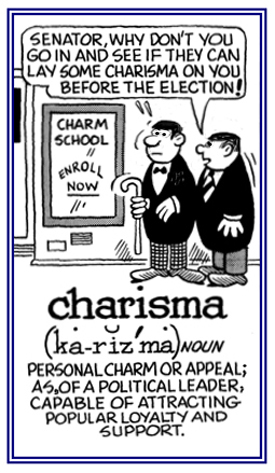charis- +
(Greek: grace, beauty, kindness; to rejoice at; extended to attractiveness, personal charm)
2. The ability to inspire enthusiasm, interest, or affection in people by means of personal charm or influence.
3. In theology, a divinely conferred gift or power.
4. A spiritual power or personal quality that gives an individual influence or authority over large numbers of people.
5. The special virtue of an office, function, position, etc., that confers or is thought to confer on the person holding it an unusual ability for leadership, worthiness of veneration, or the like.
6. Etymology: from German, used by Max Weber (1864-1920) in "Wirtschaft u. Gesellschaft" (1922) for "gift or power of leadership or authority", from Greek kharisma, "favor, divine gift"; from kharizesthai, "to show favor to", from charis, "grace, beauty, kindness"; related to chairein, "to rejoice at".
The more mundane sense of "personal charm" was first recorded in 1959. Charismatic (1970) Christian movement, which believes in divine gifts of healing, etc., reflects the older sense of the word (which was in English as charism, plural charismata, since c.1641.
Historical background of charisma
The Greek word charisma, meaning "favor, gift", occurs several times in Greek translations of the Bible, primarily in the New Testament. It carries both the general sense of "grace", equivalent to the Greek noun charis, and the more specific sense of a spiritual gift or talent divinely granted to a person as a token of grace and favor and exemplified by the power of healing, the gift of tongues, or prophesying.
The first secular use of charisma seems to have been its use by the German sociologist Max Weber in his 1922 publication Wirtscaft und Gesellshaft. This particular work was not translated into English until 1947, but even before this, Weber's use of charisma was being discussed.
The trend has been to use charisma almost synonymously with "appeal" or "magnetism". In addition to magnetic political leaders, celebrities of all kinds have been described as having charisma, including evangelists, movie stars, athletes, generals, and writers.
Some usage commentators have denounced this devaluation or trivialization of charisma, but such a broadening and weakening of meaning is often the price of popularization.

Go to this Word A Day Revisited Index
so you can see more of Mickey Bach's cartoons.
2. Possessing great powers of charm or influence.
3. Of, relating to, or being a type of Christianity that emphasizes personal religious experience and divinely inspired powers, as of healing, prophecy, and the gift of tongues.
